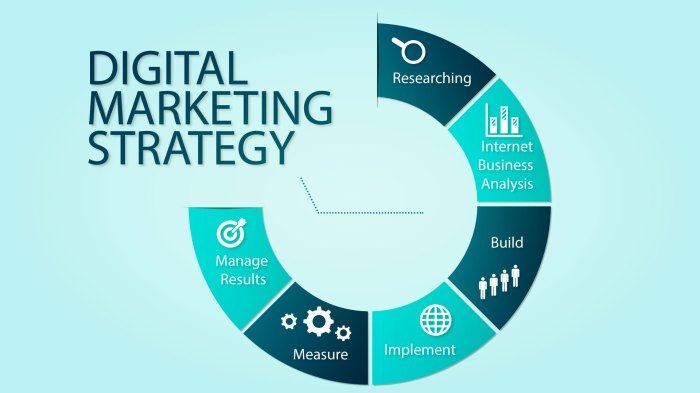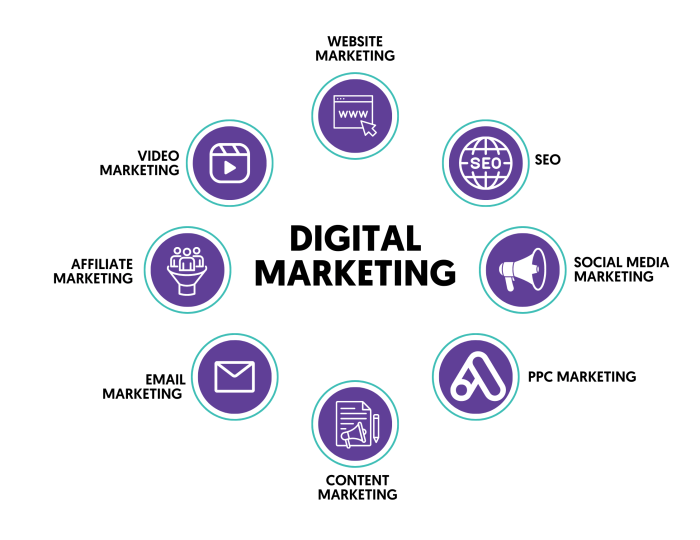Kicking off with Digital Marketing Strategy, this opening paragraph is designed to captivate and engage the readers, setting the tone for a high school hip style that unfolds with each word. In today’s digital age, having a well-defined digital marketing strategy is crucial for businesses looking to thrive in the online world. From social media to , every component plays a vital role in shaping a company’s digital footprint and driving growth.
Let’s dive into the world of digital marketing strategy and explore its key components, development process, and implementation techniques that can elevate a brand’s online presence to new heights.
Importance of Digital Marketing Strategy

Having a well-defined digital marketing strategy is crucial in today’s fast-paced online landscape. It allows companies to effectively reach their target audience, engage with potential customers, and ultimately drive sales and growth.
Impact on Company’s Online Presence and Growth
A strong digital marketing strategy can significantly impact a company’s online presence by increasing brand visibility, driving website traffic, and improving search engine rankings. By utilizing various digital channels such as social media, email marketing, and content marketing, companies can connect with their audience on a more personal level and build lasting relationships.
- Increased Brand Awareness: Digital marketing strategies help companies increase brand awareness by reaching a wider audience and staying top-of-mind with potential customers.
- Lead Generation: Effective digital marketing strategies can generate leads through targeted campaigns and engaging content, leading to increased sales opportunities.
- Customer Engagement: By leveraging social media and other digital platforms, companies can actively engage with their audience, respond to feedback, and provide valuable content that resonates with customers.
Examples of Successful Companies
Many successful companies attribute their growth to a strong digital marketing strategy. One notable example is
Amazon
, which has leveraged digital channels to reach a global audience and dominate the e-commerce market. Another example is
Netflix
, which has used digital marketing to promote its original content and attract millions of subscribers worldwide.
Components of a Digital Marketing Strategy

In a digital marketing strategy, there are several key components that play a crucial role in reaching and engaging with the target audience. These components work together to create a comprehensive strategy that drives business growth and success.
Content Marketing
Content marketing is essential in a digital marketing strategy as it involves creating and sharing valuable, relevant, and consistent content to attract and retain a clearly-defined audience. This component focuses on providing useful information to the target audience, establishing credibility, and building relationships with potential customers.
- Create blog posts, articles, videos, and infographics to educate and inform your audience.
- Distribute content through various channels such as social media, email newsletters, and website blogs.
- Focus on creating high-quality, engaging content that resonates with your target audience.
Social Media
Social media plays a crucial role in a digital marketing strategy by allowing businesses to connect with their audience, build brand awareness, and drive engagement. This component involves leveraging social media platforms to share content, interact with followers, and promote products or services.
- Use social media platforms like Facebook, Instagram, Twitter, and LinkedIn to engage with your audience.
- Create a social media content calendar to plan and schedule posts for consistent and strategic sharing.
- Monitor social media metrics to track performance and optimize strategies for better results.
(Search Engine Optimization)
is crucial in a digital marketing strategy as it helps businesses improve their online visibility and drive organic traffic to their website. This component involves optimizing website content, metadata, and structure to rank higher in search engine results pages.
- Research relevant s and incorporate them into website content to improve search engine rankings.
- Optimize meta titles, descriptions, and tags to enhance visibility and click-through rates.
- Build high-quality backlinks to improve domain authority and increase website credibility.
Email Marketing
Email marketing is a powerful component of a digital marketing strategy as it allows businesses to communicate directly with their audience, nurture leads, and drive conversions. This component involves sending targeted and personalized emails to subscribers to promote products, share updates, and build relationships.
- Create segmented email lists based on customer preferences, behaviors, and demographics.
- Design eye-catching and mobile-responsive email templates to improve open and click-through rates.
- Track email performance metrics like open rates, click-through rates, and conversions to optimize campaigns for better results.
Paid Advertising
Paid advertising is a crucial component of a digital marketing strategy as it allows businesses to reach a larger audience, drive targeted traffic, and increase brand visibility. This component involves running paid campaigns on various platforms like Google Ads, Facebook Ads, and LinkedIn Ads to promote products or services.
- Set clear campaign objectives, target audience, and budget to maximize ROI and reach desired outcomes.
- Create compelling ad copy, visuals, and CTAs to attract and convert potential customers.
- Monitor campaign performance, analyze data, and make adjustments to optimize ad spend and improve results.
Developing a Digital Marketing Strategy
When it comes to developing a digital marketing strategy, there are several key steps that need to be followed in order to create an effective plan that aligns with business goals and objectives.
Market Research
Market research is crucial in the development of a digital marketing strategy as it helps businesses understand the current market landscape, identify opportunities, and assess potential threats. By conducting thorough market research, businesses can gather valuable insights that will inform their digital marketing decisions.
- Identify market trends and consumer behavior.
- Analyze industry data and competitor strategies.
- Understand customer needs and preferences.
Target Audience Analysis
Understanding the target audience is essential for creating a successful digital marketing strategy. By segmenting the target audience and developing detailed buyer personas, businesses can tailor their marketing efforts to effectively reach and engage with their ideal customers.
- Identify demographics, psychographics, and behavior patterns.
- Segment the audience based on needs and preferences.
- Create personalized messaging and content for each segment.
Competitive Analysis
Conducting a competitive analysis allows businesses to assess the strengths and weaknesses of their competitors, identify gaps in the market, and differentiate their brand. By analyzing competitor strategies and tactics, businesses can gain a competitive edge and position themselves effectively in the market.
- Identify key competitors and their market share.
- Analyze competitor products, pricing, and promotional strategies.
- Identify areas of opportunity and potential threats.
Aligning Business Goals with Digital Marketing Objectives
In order to create a successful digital marketing strategy, it is crucial to align business goals with digital marketing objectives. By setting clear and measurable goals, businesses can track their progress, evaluate the effectiveness of their strategies, and make adjustments as needed to achieve their desired outcomes.
- Define specific, measurable, achievable, relevant, and time-bound (SMART) goals.
- Align digital marketing objectives with overall business objectives.
- Track key performance indicators (KPIs) to measure success.
Implementing and Executing a Digital Marketing Strategy
Implementing a digital marketing strategy involves putting the planned tactics into action across various online channels to reach the target audience effectively.
Tracking and Measuring Key Performance Indicators (KPIs)
- Tracking KPIs is essential to evaluate the success of a digital marketing strategy.
- Key metrics like website traffic, conversion rates, click-through rates, and social media engagement help in assessing performance.
- Tools like Google Analytics, SEMrush, and HubSpot can assist in monitoring KPIs and analyzing data.
Tools and Technologies for Execution, Digital Marketing Strategy
- Email Marketing Platforms: Mailchimp, Constant Contact
- Social Media Management Tools: Hootsuite, Buffer
- Content Management Systems: WordPress, Joomla
- Search Engine Optimization () Tools: Ahrefs, Moz
- Pay-Per-Click (PPC) Advertising Platforms: Google Ads, Facebook Ads Manager
